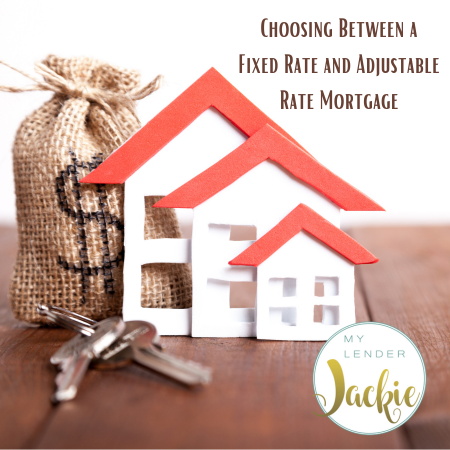When you’re buying a home, one of the biggest decisions you’ll make is choosing the type of mortgage that works best for your financial situation. Two of the most common options are fixed rate mortgages (FRMs) and adjustable-rate mortgages (ARMs). Understanding the differences between these two types of loans is essential for making an informed decision and ensuring long-term financial stability.
We are always available to answer any of your questions, so reach out any time. We also have some helpful information below to support you in making a confident and informed decision.
What is a fixed rate mortgage (FRM)?
 A fixed rate mortgage is exactly what it sounds like—a mortgage loan with an interest rate that remains the same throughout the life of the loan. Whether you choose a 15-year or 30-year fixed-rate mortgage, the interest rate and monthly payment for principal and interest will not change over the term.
A fixed rate mortgage is exactly what it sounds like—a mortgage loan with an interest rate that remains the same throughout the life of the loan. Whether you choose a 15-year or 30-year fixed-rate mortgage, the interest rate and monthly payment for principal and interest will not change over the term.
The benefits of a fixed rate mortgage are mostly based in how predictable they are. With a fixed rate mortgage, you’ll always know exactly how much you owe every month, which makes budgeting easier. The consistent interest rate protects you from market fluctuations, so even if rates rise significantly, your rate remains unchanged.
It is a simple mortgage option that is not risky or complicated, so it’s a great fit for many buyers. The potential downsides to choose a fixed-rate mortgage are having a higher interest rate initially than you would with an adjustable-rate mortgage, and less flexibility. If you have a fixed-rate mortgage and interest rates come down below what you have, you will have to go through the process of refinancing to take advantage of them.
What is an adjustable-rate mortgage (ARM)?
An adjustable-rate mortgage (ARM) has an interest rate that can change over time. ARMs typically start with a lower initial interest rate for a fixed period—commonly 3, 5, 7, or 10 years—before the rate adjusts annually based on market conditions.
For example, a 5/1 ARM means the interest rate is fixed for the first five years and then adjusts every year thereafter. There are some clear financial benefits to an ARM, including lower initial costs. ARMs usually start with lower interest rates than fixed-rate mortgages, so they can be a great fit for someone who expects to increase their income in a few years, but is currently on a tighter budget.
An ARM will also allow you to not miss out on any beneficial market changes. If market rates decrease after the initial fixed period, your rate could adjust downward, resulting in lower monthly payments. ARMs are also a good option for buyers who plan to sell or refinance before the fixed-rate period ends.
Just know that once the fixed period ends, your rate could increase significantly, making monthly payments unpredictable and potentially unaffordable. There is a level of risk involved with an adjustable-rate mortgage that you won’t deal with if you have a fixed rate.
Deciding Between a FRM and an ARM
The decision between an FRM and an ARM depends largely on your financial goals, lifestyle, and risk tolerance. Here are some scenarios to help guide your choice:
You Should Choose a Fixed Rate Mortgage If:
- You plan to stay in your home for many years and want the predictability of a consistent monthly payment.
- You’re buying in a market where interest rates are historically low, and you want to lock in that rate for the long term.
- You’re risk-averse and prefer the security and predictability of a fixed payment, even if it means a slightly higher rate upfront.
You Should Choose an Adjustable-Rate Mortgage If:
- You expect to move or refinance within a few years, before the rate adjustment period begins.
- You want to take advantage of a lower initial rate to reduce your monthly payments in the short term.
- You’re financially flexible and can handle potential rate increases in the future.
Both fixed rate and adjustable-rate mortgages offer unique benefits and drawbacks, and the right choice depends on your specific situation. Before you make a decision, let’s talk.
Ready to learn more about buying a home or apply for a mortgage? Contact us any time to get started.

